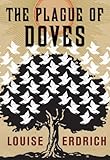 Olive Kitteridge: A Novel in Stories by Elizabeth Strout
Olive Kitteridge: A Novel in Stories by Elizabeth StroutMy review
rating: 4 of 5 stars
13 stories linked stories portray a small town in Maine and particularly the strong-willed and often irascible Olive of the title. Olive is the main subject of only a couple of them and appears peripherally in the rest, making at least a small impact in many townspeople's lives by the force of her personality (which is less than sunny and warm, but she is a thinker). This is a fine, fine book - the writing is smooth as silk and the characters are memorable.
View all my reviews.
The other shortlisted books were Plague of Doves by Louise Erdrich and All Souls by Christine Schutt - my Goodreads Reviews below.
 All Souls by Christine Schutt
All Souls by Christine SchuttMy review
rating: 3 of 5 stars
This is the kind of book that makes me feel that I'm not getting quite enough oxygen. The writing is excellent but somehow a bit rarefied - there are many characters, but I never felt much empathy or even understanding for a single one of them.
The characters are the students (seniors all) and teachers of an exclusive girls' school in Manhattan (in 1997, for some reason), along with a few assorted parents, with the hub of the story being Astra Dell, a senior with a particularly virulent form of cancer. Astra's illness affects all the characters to a greater or (often) lesser degree, but the girl herself remains a cipher.
If there were more warmth or immediacy to this slim book, I would recommend it to older YAs - but unfortunately, the diamond-clear writing simply makes everything feel a bit cold.
View all my reviews.
 The Plague of Doves: A Novel by Louise Erdrich
The Plague of Doves: A Novel by Louise ErdrichMy review
rating: 4 of 5 stars
Everyone in Pluto, North Dakota, whether white, Ojibwe, or both, is related to everyone else through blood, marriage, or circumstance. Various characters take turns telling their tales, some from the late 19th century but most contemporary or nearly so, and the stories are so intertwined that a chart would have been much appreciated. Some stories are tragic, others bittersweet, funny, or downright odd (one of the strangest and hardest to grasp was Marn's story of her marriage to a cult leader named Billy - it involved snakes, cultish scariness, sex, and some magical elements) - but most have a strip of solid humanity and humor that links them all together. The people of Pluto are unique and intriguing folks and have plenty to say. My favorite Plutonian is Mooshum, a grandfather who hangs out with his fiddle-playing brother, drinking booze and delighting in baiting the local priest. He's outrageous and irrepressible and plays a constant, if peripheral, role in the goings-on of the town. This is a lovely read - Erdrich sure knows how to tell a story (or 5 or 6).
View all my reviews.
I can't believe you read all of the novels short-listed for the Pulitzer Prize.
ReplyDelete